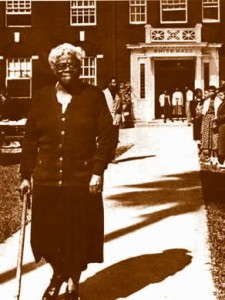
Dr. Mary Bethune in front of White Hall on the campus of Bethune-Cookman College in Daytona Beach, Florida
Mary McLeod Bethune founded the Daytona Educational and Industrial Training School in 1904. The school underwent several stages of growth and development through the years and in 1923, it merged with the Cookman Institute of Jacksonville, Florida and became a co-ed high school. A year later in 1924, it became affiliated with the Methodist Church. By 1931, the school had become a junior college.
The school became a four-year college in 1941 when the Florida Board of Education approved a 4-year baccalaureate program in Liberal Arts and Teacher Education. The name was changed to Bethune-Cookman College.On February 14, 2007, the Board of Trustees approved the name Bethune-Cookman University after the institution established its first graduate program.
In October 2010 the American Association of University Professors accused the university administration of improperly dismissing tenured members of the faculty—some for alleged sexual harassment (but, in the opinion of the AAUP, without due process), others for “budgetary reasons” but without a declaration of “financial exigency”. The university responded saying that the AAUP report contained errors and a one-sided view.
Presidents
Bethune retired in 1942 at which time James A. Colston became president until 1946 when Bethune resumed the presidency for a year.
Richard V. Moore, Sr. became president in 1947. Under his tenure the college was accredited by the Southern Association of Colleges and Schools in 1970, joined the United Negro College Fund and other academic and professional organizations. The curriculum expanded, student enrollment increased and new buildings were constructed for residential housing and classrooms.
Oswald P. Bronson, Sr.(B-CU alumnus) served as the fourth president of the college from 1975 to 2004. During his tenure increased student enrollment led to continuous development and expansion of the college. A rapidly increasing student enrollment led to construction of more student housing, classroom buildings and the Mary Mcleod Bethune Auditorium. Major fields of study increased from 12 in 1974 to 37 by 2003. In addition, seven continuing education centers for students began operating throughout the state. While maintaining accreditation by SACS, Florida Board of Education, and the United Methodist Church Board of Higher Education the college added new accreditations in the Nursing and the Teacher Education programs.
Trudie Kibbe Reed was appointed to the presidency in August 2004 by the Board of Trustees. Reed was the first woman to serve in this capacity since Bethune. The university saw a number of campus improvements including construction of the Center for Civic Engagement, the L. Gale Lemerand School of Nursing, the creation of the Alexis Pugh and Eugene Zimmerman Scholarship houses, and the provision of a university-owned house as an alumni center during her tenure. Reed also established the university’s first graduate program under the School of Graduate & Professional Studies and a Master of Science in Transformative Leadership.
Dr. Edison O. Jackson was appointed as the university’s interim president in May 2012.